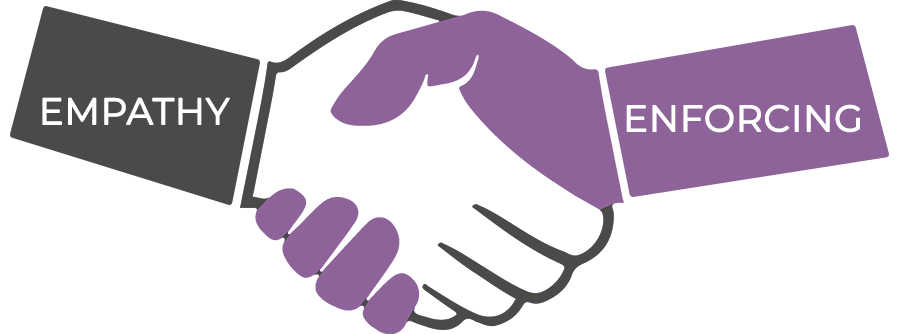You’re a boss!! How exciting is that?
Except that – omg – there are so many people issues – is this really your job now?
You’re finding yourself now playing this middle manager role – you, yourself have people to report to, and you’re also responsible for the people reporting in to you.
And sometimes…. they won’t stop complaining.
You want to be kind, you want to be effective, you want to listen – you want to keep that channel of communication open, but omg, they just complain and vent so much. You tell yourself that you’re supposed to deal with this. It’s your job as a leader to listen and empathize. You certainly can’t tell them to get over it, shut up, and get back to work…. Right? No, no, you can’t do that. That wouldn’t be effective…
So you keep listening, lending an ear anytime they’re worked up, pissed off, or frustrated about what’s happening at work. But you’re starting to notice something that you don’t like. Your own emotional bandwidth is starting to feel thin. You find yourself taking on their emotional baggage and bringing it home with you. Once you’re at home, you’re not quite yourself. It’s like you “used up” all your patience listening to your team complain, and now, when you’re home with the people you care about the most, you’re impatient and quick to anger. Small things start to piss you off, and instead of getting support from the people you love, you’re starting to push them away – and that’s the last thing you want.
You’re also being really hard on yourself. You notice yourself making one mistake, providing information that you thought was correct, only to then realize it wasn’t the right information. With limited emotional bandwidth, you feel so frustrated that you snap. In front of your team. Well, sh**. That’s not the kind of leader you want to be. Sigh.
What do you do? It starts to feel like taking this role of leader was a mistake. Do you have it in you? Do you even want this job?
Leadership Is Tough
First of all – I feel you. Being a leader can be hard. And being a good leader is even harder. And of course you want to be a good leader. I mean – you want to be a good everything, don’t you?
Yeah – because you’re a high achiever. You’re dedicated. And you genuinely do care. You care about getting good results for your organization, and you care about being a good leader to these people.
So, before you talk yourself out of this role, let me assure you that you can stay in this game.

I want to talk you through one of the most powerful things I’ve ever learned in my journey as a leader. I also used to think that the most important thing for me to do is to be kind and patient and make sure that I always listened. But I ended up feeling frustrated, resentful, and kind of lost.
And then I learned that I was actually struggling with something that us coaches call “false choice.” Part of me believed that I only had two choices.
Choice 1: Listen, be kind, and make sure that I am serving my people well (where I ended up feeling like a doormat)
Choice 2: Drop the freaking hammer. Let them know that I was the boss, and that certain behavior (like complaining or venting) was unacceptable (and that sentiment was just dripping in judgment, btw).
These are my choices, right? What else can I do??
Well, what I’m describing here is essentially empathy (choice 1) or enforcing (choice 2).
I remember when I got a new person on my team. I’ll call her Joanna. And I was soo excited to hire her. She was a ROCKSTAR. She was so smart, so conscientious, she was just ON it. To this day, I’d love to have her on my team again (this was from my days in my “9-to-5” job).
But when one of the more difficult people on my team (which, btw, at this point in my journey, I know better than to label somebody else as “difficult” – “difficult” is a function of the relationship between two people where their rigidities create hard situations (usually for both people).
But anyway – this “difficult” person, who I will call Charlotte, kept giving me, um, “difficulty” and I kept leaning into choice 1. That was my job, right?
And Joanna very kindly, in her own words, basically asked me why I let her “get away with so much.”
Crap.
I thought I was handling myself like I was supposed to. But Joanna spotted it in an instant. And because she and I jived well (no “difficult person” labels happening between us), she was open with me (kudos to her for her courage).
False Choices
I talked to my executive coach about it. “False choice” she said.
Huh?
“You’re telling yourself that your choices are A or B. It’s a lie that you’re telling yourself to let yourself stay in black and white thinking.”
By telling yourself that your choices are A or B, you're telling yourself a lie so you can stay in black and white thinking. Click To TweetHmmm. My head kind of hurt. Black and white thinking? Ok, I think I get what that is. It’s like a failure to get that there’s a “gray area.”
So, what is the “gray area” between empathy and enforcing?
“It’s not a gray area between them. They co-exist.”

I imagine that my face looked like a cross between “I’m squinting to see something far away” and “Oh, do we not do mouth breathing here??”
They co-exist. Huh. Aren’t they opposites?
And therein lies the paradox. One of the most powerful concepts I’ve ever learned in my career and my life is noticing where a paradox exists.
In my sessions, I make the painfully nerdy joke about “pair ’o’ docks” by showing a photo of two docks. Or worse – “pair ’o’ docs” by showing pics of two doctors. (In our new book, we actually use the photo of the two of us docs, Dr. Phillip Meade and Dr. Laura Gallaher with this joke. Oh the vulnerability of our nerdiness…)
Anyway, paradox. Two ideas that, on the surface, seem to contradict, but upon closer inspection, you realize, do coexist. Liiiiiike empathy and enforcing.
Hmmm….
The Power of the Paradox

Learning how to simultaneously have empathy and hold boundaries was – whoa – profoundly powerful.
I remember telling my boyfriend at the time about how empathy and enforcing co-exist – and how, if I’m high on empathy, but only medium on enforcing, that I’d hit a breaking point in my own patience, and my empathy would drop to almost nothing and enforcing would shoot through the roof. He verified that was 1000000% true in our relationship too.
Ohhh… I learned. That sounds like the scenario I described above- about you, right?
Yeah… because it’s not a new experience. It is an experience that is wildly shared between people, especially high achieving leaders who are navigating this journey of leadership.
Man, there were so many things that I wish I learned before I was stepping into leadership roles. But I was fortunate to have tools around me to learn more about myself, my own fears, and how they affected my behavior.
That’s why Dr. Phillip Meade and I created an online, self-paced program called “Digital Leadership Catalyst.” After spending thousands of hours working with leaders across all industries and experience levels, we created a program that’s unlike any other leadership development program out there.
It uses the science of human behavior to leverage results, and will help you become a highly effective leader with the tools needed to maximize your team’s engagement and drive results.
We begin course one by focusing on the human being, because that’s where real change occurs and is where you’ll see the true impact of this program. Want to watch a lesson for FREE? Click here to access it!



4 replies on “Think You Either Have to Be a Doormat or Drop the Hammer? Think Again.”
I liked this read,it reminded me so much of how I was when managing. I did exactly how you described it, I would get home and be quick to anger. I had learned what was suggested, but I would slip back on occasion to the black and white mode. Thank you for allowing me to join Insider Edge.
Hi James! Thank you so much for your comment. I think it’s a common experience for leaders! So happy you joined Insider Edge – we have over 100 5-min videos for people to learn how to handle the challenges of leadership!
Well Done Lady, you have a great style and true skill and are providing great tools for this journey of Leadership. I hope you and Phillip keep leaning into this.
This blog post provides valuable insights into a common misconception about leadership: that you have to choose between being a doormat or using an authoritarian approach. The author offers practical advice on how to find a balance and become an effective leader without compromising your values or style. Overall, this is an informative and engaging read for anyone interested in leadership and management.